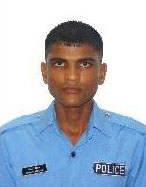The Maldivian citizen who conducted a terrorist attack against Pakistan’s Inter-Services Intelligence (ISI) headquarters in 2009, was brainwashed during his madrassa education in Pakistan, claims his brother.
On May 27, 2009, Ali Jaleel – along with two other men – stormed Pakistan’s Inter-Services Intelligence (ISI) headquarters in Lahore and detonated a car bomb that killed about 30 people and injured 300.
Jaleel allegedly received funding from a US citizen, Reaz Qadir Khan – currently charged in the US with conspiracy to provide material support to a terrorist – to pay for admission into a terrorist training camp in Pakistan.
Jaleel was brainwashed while studying at the Pakistani madrassa Jamia Salafia seminary, his brother Jalla claimed in an investigative feature story, conducted by US publication The Oregonian.
“He had been brainwashed,” Jalla told the US publication. “He thought jihad was the best way to meet God.”
Jaleel began his studies at the Jamia Salafia seminary in Faisalabad, Pakistan, in 1995. When Jaleel returned to the Maldives a year after beginning his studies at the Pakistani madrassa, he was “different”, according to The Oregonian.
Jalla explained that in addition to the changes in Jaleel’s appearance – he grew a beard and wore salwars, a popular form of Pakistani dress – “Ali was righteous and distant”.
Although the brothers previously had a very close relationship, a rift began to develop due to Jaleel’s new-found ideology and behavior.
By 2001, jihad became the only thing that mattered to 22 year-old Jaleel, who spoke of emigrating to Yemen and “being a messenger for Allah” and had abandoned his previous dreams of becoming a “sports here”, according to Jalla.
Madrassa drive
In the late 1970’s, former President Maumoon Abdul Gayoom wanted to westernise the islands to prepare Maldivians for the introduction of international luxury tourism and believed education was “the key”, according to The Oregonian.
However, few educational options were available in the Maldives beyond a 10th grade education, with opportunities to study abroad limited to “well connected” Maldivian families.
India and Pakistan responded by offering inexpensive postsecondary education opportunities to Maldivian citizens at religious schools, beginning in the late 1970’s and early 1980’s.
“It was very cheap. Pakistan said, ‘Give us your kids, we will teach them the Quran,'” President’s Office Spokesperson Masood Imad told The Oregonian, in regard to the “madrassa drive.”
Maldivian government officials began expressing their concern in 2006 that Maldivians were returning from their madrassa studies in Pakistan with radical beliefs, according to the US publication.
Imad claimed that the Maldivian government is no longer sending students to study in Pakistan, because “the risk is perceived to be too great”.
“When people say, ‘jihadis,’ we’re scared, damn scared,” Imad said. “It’s going to hurt our economy.”
Unclear government policy
Whether Maldivian students are still traveling to Pakistan for their postsecondary studies, or if there is a monitoring policy in place for the madrassas they are attending, remains unclear.
Islamic Affairs Minister Sheikh Mohamed Shaheem Ali Saeed told Minivan News to ask the Education Minister.
The Education Minister Asim Ahmed and Foreign Affairs Minister Dr Abdul Samad Abdullah were not responding to calls at time of press.
Religious conservatism and extremist violence have been increasing in the Maldives over the past decade, while incidents of Maldivians joining overseas jihadist groups are becoming more common, according to a 2013 report published in the Combating Terrorism Center (CTC) Sentinel, a publication based out of the West Point military academy in the US.
The report found that education in foreign madrasas has also contributed to growing extremism within the Maldives, with students “unwittingly attending more radical madrasas” and preaching these views upon their return.
“The offer of free education in madrasas in Pakistan and Saudi Arabia is widely acknowledged as a core means of radicalising Maldivians locally, with well-meaning parents sending their children off on scholarships to ‘study Islam’,” the report states.
Following the 2007 terrorist attack in Male’s Sultan Park, “Gayoom himself warned of this problem”.
“Maldivians are influenced by what is happening in the world. They go to Pakistan, study in madrasas and come back with extreme religious ideas,” the report quoted Gayoom as saying.
However, in August 2012, the Maldivian government said there was no truth in claims Maldivian citizens were being radicalised at Pakistan-based madrassas, following the publication of the US State Department’s 2011 terrorism report.
Active steps had been taken against permitting clearance for local students to study in any madrassas in Pakistan, President’s Office spokesperson Abbas Adil Riza said at the time.
“No Maldivians right now are being trained in Pakistani madrassas. Steps are being taken to ensure this with the Ministry of Foreign Affairs and authorities in Pakistan,” he said. “We will not issue visas to go there in this regard. So to say that such a threat exists is definitely not true.”
However, the following month, former State Minister of Education Aminath Ali highlighted the need to simplify the Pakistani visa procedure for Maldivian students hoping to enter the country’s higher-learning institutions.
In early 2010, then-Vice President Mohamed Waheed Hassan Manik told Indian media that young Maldivians are being recruited by militant groups in Pakistan and Afghanistan to wage ‘jihad’.
Waheed claimed an increasing number of young Maldivians “are embracing a version of Islam which is more strict than the traditional Islamic values [of the Maldives].”
In late 2010, a diplomatic cable was leaked that highlighted United States diplomats expressed concern back in October 2008 regarding the activities of “al-Qaida associates” in the Maldives.
“While many Maldivian participants of extremist online forums aimed to ultimately fight Coalition forces in Iraq and Afghanistan, mid-October 2007 debrief information following the September 29 bombing in Male’ that targeted tourists indicates at least two of the operatives participated in the attack in exchange for travel from the islands after the operation and arranged study at a madrassa in Pakistan.”
Likes (0)Dislikes
(0)Dislikes (0)
(0) 

